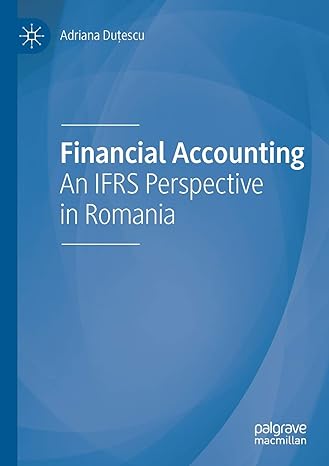Question
Which of the following accounting concepts justifies the following practice: For financial reporting purposes, the economic life of the business is divided into months, quarters,
Which of the following accounting concepts justifies the following practice: For financial reporting purposes, the economic life of the business is divided into months, quarters, or years?
Materiality
Periodicity
Full disclosure
Consistency
In which balance sheet section would trademarks be reported?
| Property, plant, and equipment | ||
| Current assets | ||
| Intangible assets |
Entity F has current assets of $1,600,000 and current liabilities of $750,000. If the company issues $200,000 of new stock what will its new current ratio be? (rounded)
| 2.13:1 | ||
| 1.7:1 | ||
| 1.9:1 | ||
| 2.4:1 |
Which statement is correct?
| The cash basis of accounting is objective because no one can be certain of the amount of revenue until the cash is received. | ||
| As long as management is ethical, there are no problems with using the cash basis of accounting. | ||
| As long as a company consistently uses the cash basis of accounting, generally accepted accounting principles allow its use. | ||
| Use of the cash basis of accounting violates both the revenue recognition and expense recognition principles. |
-
Entity D had the following information available: Inventory 3,000 Accounts payable 4,700 Accounts receivable 1,500 Accumulated depreciation, equipment 4,000 Cash 2,600 Common stock 4,800 Equipment 7,500 Land 10,000 Intangible assets 2,500 Notes payable (due in 5 years) 6,000 Retained earnings 16,000 Stock investments (long-term) 8,400 On the classified balance sheet, what is the amount for long-term liabilities?
$10,700
$6,000
$20,800
$4,700
2.4 points
QUESTION 18
-
Entity D had the following information available: Inventory 3,000 Accounts payable 4,700 Accounts receivable 1,500 Accumulated depreciation, equipment 4,000 Cash 2,600 Common stock 4,800 Equipment 7,500 Land 10,000 Intangible assets 2,500 Notes payable (due in 5 years) 6,000 Retained earnings 16,000 Stock investments (long-term) 8,400 On the classified balance sheet, what is the amount for total stockholders' equity?
$10,700
$20,800
$16,000
$31,500
Entity C's total liabilities decreased by $75,000 and its stockholders equity increased by $15,000. Entity C's total assets must change by what amount and in what direction during that same period?
| $60,000 decrease | ||
| $60,000 increase | ||
| $90,000 increase | ||
| $75,000 increase |
Entity D had the following information available: Inventory 3,000 Accounts payable 4,700 Accounts receivable 1,500 Accumulated depreciation, equipment 4,000 Cash 2,600 Common stock 4,800 Equipment 7,500 Land 10,000 Intangible assets 2,500 Notes payable (due in 5 years) 6,000 Retained earnings 16,000 Stock investments (long-term) 8,400 On the classified balance sheet, what is the amount for total current assets?
| $10,700 | ||
| $31,500 | ||
| $8,400 | ||
| $7,100 |
Entity K purchased $8,500 worth of office supplies on June 2 and recorded the purchase as an asset. On June 30, an inventory of supplies indicated only $1,500 on hand. The adjusting entry that should be made by the company on June 30 is:
| Dr. Supplies Expense 1,500 Cr. Supplies 1,500. | ||
| Dr. Supplies 7,000 Cr. Supplies Expense 7,000. | ||
| Dr. Supplies 1,500; Cr. Supplies Expense 1,500. | ||
| Dr. Supplies Expense 7,000; Cr. Supplies 7,000. |
Entity E purchased land for a warehouse several years ago for $1 million. Although a recent appraisal suggests a market value for the land of $2.5 million, the financial statements reflect a value of $1 million. This is an example of:
| Comparability | ||
| Full disclosure | ||
| Consistency | ||
| Historical cost |
On Entity A's statement of cash flows, Entity A's payment of cash dividends is a (an):
| Non-cash investing and financing activity. | ||
| Operating activity. | ||
| Investing activity. | ||
| Financing activity. |
Entity M signed a four-month note payable in the amount of $40,000 on November 1. The note requires interest at an annual rate of 6%. The amount of interest expense Entity M must recognize at December 31 is:
| $400. | ||
| $2,400. | ||
| $1,200. | ||
| $200. |
Entity H received a cellphone bill that it will pay next month. The entry to record this transaction will include:
| a debit to Utility Expense and a credit to Cash | ||
| a debit to Prepaid Utilities and a credit Cash | ||
| a debit to Utility Expense and a credit to Accounts Payable | ||
| a debit to Prepaid Utilities and a credit to Accounts Payable |
Step by Step Solution
There are 3 Steps involved in it
Step: 1

Get Instant Access to Expert-Tailored Solutions
See step-by-step solutions with expert insights and AI powered tools for academic success
Step: 2

Step: 3

Ace Your Homework with AI
Get the answers you need in no time with our AI-driven, step-by-step assistance
Get Started


